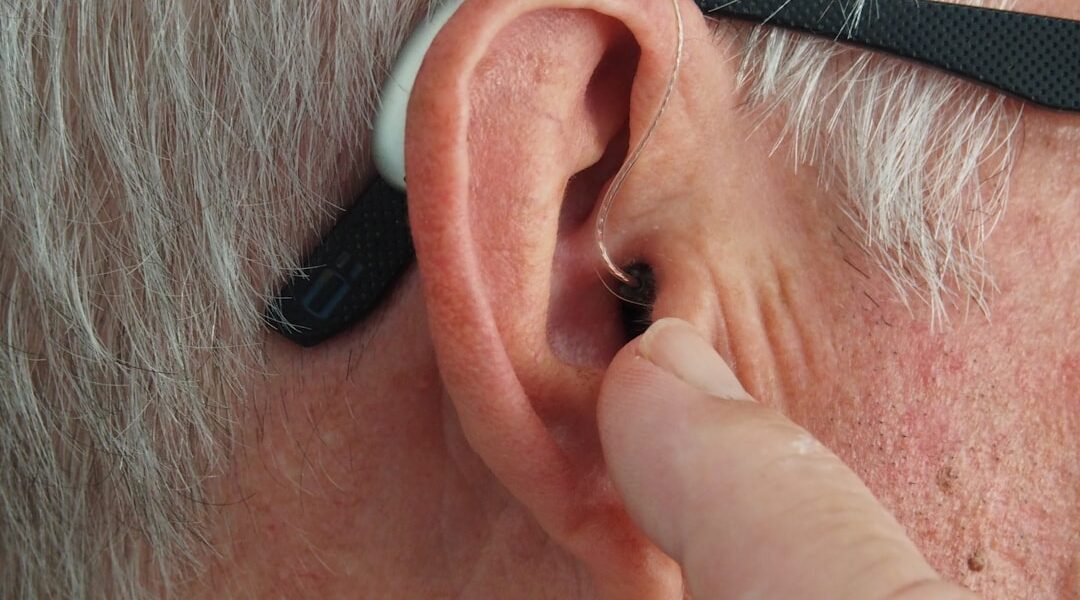Fluttering in the ear, medically termed tinnitus, is a prevalent condition affecting millions of people worldwide. It is characterized by the perception of sound in one or both ears without an external source. These sounds can manifest as fluttering, buzzing, ringing, or other auditory sensations.
The intensity and frequency of tinnitus can vary, ranging from occasional and mild to constant and severe. Various factors can contribute to the development of tinnitus, including:
1. Exposure to loud noises
2.
Age-related hearing loss
3. Ear infections
4. Cardiovascular issues
5.
Certain medications
6. Head or neck injuries
7. Stress and anxiety
While tinnitus is generally not indicative of a serious underlying health condition, it can significantly impact an individual’s quality of life.
It may affect concentration, sleep patterns, and overall well-being. In some cases, tinnitus can be a symptom of an underlying medical condition that requires attention. Management of tinnitus often involves a multidisciplinary approach, including audiological evaluations, sound therapy, cognitive behavioral therapy, and in some cases, medication.
Individuals experiencing persistent or severe tinnitus should consult a healthcare professional for proper diagnosis and treatment options.
Key Takeaways
- Fluttering in the ear is a sensation of a rapid, irregular, or trembling sound in the ear, which can be bothersome and concerning for individuals experiencing it.
- Common causes of fluttering in the ear include muscle spasms, earwax buildup, middle ear myoclonus, and Eustachian tube dysfunction.
- Medical conditions associated with fluttering in the ear may include Meniere’s disease, tinnitus, and acoustic neuroma.
- Diagnosis and evaluation of fluttering in the ear may involve a physical examination, hearing tests, imaging studies, and other specialized tests to identify the underlying cause.
- Treatment options for fluttering in the ear may include medication, hearing aids, sound therapy, and in some cases, surgery to address the underlying cause.
- Home remedies and lifestyle changes for managing fluttering in the ear may include stress management, avoiding loud noises, maintaining ear hygiene, and using earplugs or earmuffs in noisy environments.
- Individuals experiencing persistent or worsening fluttering in the ear, along with other concerning symptoms such as dizziness, hearing loss, or severe pain, should seek medical attention for further evaluation and management.
Common Causes of Fluttering in the Ear
Loud Noises and Ear Damage
Exposure to loud noises, such as concerts, construction sites, or firearms, can damage the delicate hair cells in the inner ear, leading to tinnitus.
Ear Infections and Fluid Buildup
Ear infections, such as otitis media or otitis externa, can also cause fluttering in the ear due to inflammation and fluid buildup in the middle or outer ear.
Other Common Causes of Fluttering in the Ear
Additionally, age-related hearing loss, known as presbycusis, can lead to tinnitus as the sensory cells in the inner ear deteriorate over time. Other common causes of fluttering in the ear include earwax buildup, temporomandibular joint (TMJ) disorders, and certain medications, such as antibiotics, diuretics, and nonsteroidal anti-inflammatory drugs (NSAIDs).
Medical Conditions Associated with Fluttering in the Ear

In addition to the common causes mentioned above, there are several medical conditions that are associated with fluttering in the ear. These include Meniere’s disease, acoustic neuroma, and temporomandibular joint (TMJ) disorders. Meniere’s disease is a disorder of the inner ear that can cause episodes of vertigo, hearing loss, and tinnitus.
Acoustic neuroma is a noncancerous tumor that develops on the nerve that controls balance and hearing, leading to symptoms such as tinnitus, dizziness, and difficulty hearing. Temporomandibular joint (TMJ) disorders, which affect the jaw joint and surrounding muscles, can also cause tinnitus due to the close proximity of the jaw joint to the middle ear.
Diagnosis and Evaluation of Fluttering in the Ear
| Diagnosis and Evaluation of Fluttering in the Ear | |
|---|---|
| Symptoms | Fluttering sensation in the ear, hearing loss, dizziness |
| Physical Examination | Ear examination, assessment of balance and coordination |
| Hearing Tests | Audiometry, tympanometry |
| Imaging Studies | MRI, CT scan of the head and ear |
| Electronystagmography (ENG) | Assessment of eye movements to evaluate balance function |
| Other Tests | Blood tests, allergy testing, vestibular evoked myogenic potential (VEMP) test |
Diagnosing fluttering in the ear typically involves a thorough medical history and physical examination, as well as various tests to evaluate hearing and identify any underlying medical conditions. During the medical history, the healthcare provider will ask about the nature of the fluttering sound, any associated symptoms, and potential risk factors for tinnitus, such as exposure to loud noises or a history of ear infections. The physical examination may include an inspection of the ears and a neurological assessment to check for any abnormalities in the auditory system.
Additionally, hearing tests, such as audiometry and tympanometry, may be performed to assess hearing sensitivity and middle ear function. In some cases, imaging studies, such as magnetic resonance imaging (MRI) or computed tomography (CT) scans, may be ordered to rule out structural abnormalities or tumors that could be causing the fluttering in the ear.
Treatment Options for Fluttering in the Ear
The treatment of fluttering in the ear depends on the underlying cause and severity of the symptoms. In cases where tinnitus is related to exposure to loud noises or age-related hearing loss, management may involve hearing aids or sound therapy to help mask the fluttering sound and improve overall hearing. For tinnitus caused by ear infections or excessive earwax buildup, treatment may include antibiotics or earwax removal procedures to alleviate symptoms.
In some instances, medications such as tricyclic antidepressants or anticonvulsants may be prescribed to help reduce the intensity of tinnitus. For individuals with severe and persistent tinnitus that significantly impacts their quality of life, cognitive behavioral therapy (CBT) or relaxation techniques may be recommended to help cope with the symptoms.
Home Remedies and Lifestyle Changes for Managing Fluttering in the Ear

Protecting Your Ears
Avoiding exposure to loud noises and using ear protection when necessary, such as at concerts or while operating heavy machinery, can help prevent ear damage and reduce the intensity of fluttering in the ear.
Maintaining Good Ear Hygiene
Maintaining good ear hygiene by gently cleaning the ears and avoiding the use of cotton swabs can also help prevent ear infections and excessive earwax buildup, which can contribute to fluttering in the ear.
Managing Stress and Adopting a Healthy Lifestyle
Managing stress through relaxation techniques, such as yoga or meditation, can help reduce the intensity of tinnitus symptoms. Adopting a healthy lifestyle that includes regular exercise, a balanced diet, and adequate sleep can also contribute to overall ear health and reduce the impact of fluttering in the ear.
When to Seek Medical Attention for Fluttering in the Ear
While fluttering in the ear is not usually a sign of a serious health problem, there are certain circumstances where it is important to seek medical attention. These include sudden onset of tinnitus without an apparent cause, tinnitus that is accompanied by dizziness or vertigo, tinnitus that is persistent and does not improve with time, or tinnitus that is associated with other concerning symptoms such as headache or changes in vision. Additionally, if fluttering in the ear is significantly impacting a person’s quality of life, causing distress or anxiety, it is important to consult with a healthcare provider for appropriate evaluation and management.
Seeking timely medical attention can help identify any underlying medical conditions contributing to tinnitus and ensure appropriate treatment to alleviate symptoms and improve overall well-being. In conclusion, fluttering in the ear is a common condition that can be caused by a variety of factors, including exposure to loud noises, ear infections, and underlying medical conditions. While it is not usually a sign of a serious health problem, it can significantly impact a person’s quality of life and may require medical attention to manage effectively.
Diagnosing fluttering in the ear typically involves a thorough medical history and physical examination, as well as various tests to evaluate hearing and identify any underlying medical conditions. Treatment options for fluttering in the ear depend on the underlying cause and severity of the symptoms and may include hearing aids, sound therapy, medications, cognitive behavioral therapy (CBT), and relaxation techniques. In addition to medical treatments, there are several home remedies and lifestyle changes that can help manage fluttering in the ear and improve overall well-being.
It is important to seek medical attention for fluttering in the ear if it is accompanied by concerning symptoms or significantly impacts a person’s quality of life.
If you’re experiencing fluttering in your ear, it could be a sign of a condition called tinnitus. Tinnitus is the perception of noise or ringing in the ears, and it can be caused by a variety of factors such as exposure to loud noises, ear infections, or even stress. To learn more about tinnitus and how to manage its symptoms, check out this informative article on metricsgoddess.com.
FAQs
What causes fluttering in the ear?
The sensation of fluttering in the ear can be caused by a variety of factors, including muscle spasms, ear infections, Eustachian tube dysfunction, or even stress and anxiety.
Is fluttering in the ear a serious condition?
In most cases, fluttering in the ear is not a serious condition and may resolve on its own. However, if the sensation is persistent or accompanied by other symptoms such as pain, hearing loss, or dizziness, it is important to seek medical attention.
How is fluttering in the ear treated?
Treatment for fluttering in the ear depends on the underlying cause. It may include addressing any underlying medical conditions, such as ear infections or muscle spasms, or managing stress and anxiety through relaxation techniques.
When should I see a doctor about fluttering in the ear?
If you experience persistent fluttering in the ear or if it is accompanied by other concerning symptoms, such as pain, hearing loss, or dizziness, it is important to see a doctor for a proper evaluation and diagnosis.
Can fluttering in the ear be prevented?
While some causes of fluttering in the ear may not be preventable, such as muscle spasms or stress-related symptoms, practicing good ear hygiene and seeking prompt treatment for ear infections or other ear-related conditions may help reduce the risk of experiencing fluttering in the ear.




